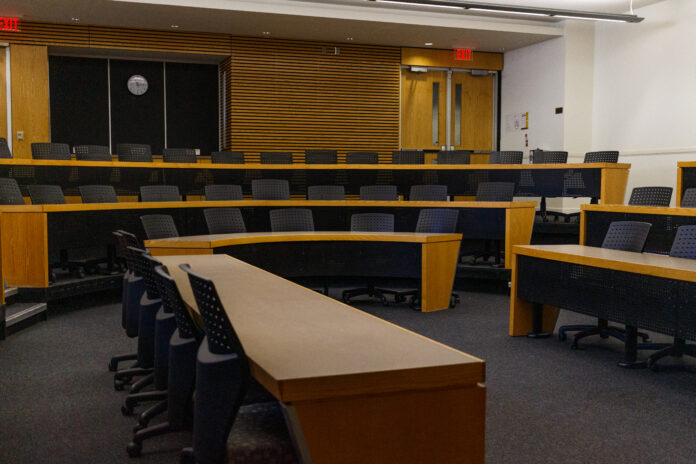With the pandemic nearing its two-year anniversary, members of the University of Waterloo community are questioning whether the university could have done a better job regarding fees charged to students during the pandemic.
Anil Gupta, a UW alumnus whose son is a first-year engineering student, emphasized the importance of bringing the issue to light. “I’m a proud University of Waterloo graduate, and the university changed my life for the better in every way possible, and I think what’s going on particularly with the residency situation is not right,” he said.
Following a previous interview with the Waterloo Region Record, Gupta explained his perspective to Imprint on why UW students should be refunded. “When you’re in [traditional] residency, the meal plan is mandatory, and the university’s response to the Record’s reach-out was that [during lockdown,] half of the students left and half stayed, which means there’s much less food costs they’re incurring… so there’s a direct financial benefit [to housing] by students not being present which they’re not gaining,” he said.
Gupta also noted that fewer students in residences would mean lower utility expenses incurred by housing, another financial benefit not passed on to students.
According to the university’s statement of operations for the 2019-2020 fiscal year and the 2020-2021 fiscal year, expenses for “supplies and other,” “minor repairs and renovations” and “equipment, maintenance and rentals” decreased by a total of $48,839 from 2019 to 2021. Over the same period, salary expenses increased by a total of $94,299.
“Students are already mentally, financially, emotionally stressed from the pandemic and the university should not be adding to that,” Gupta said.
In response to a request to verify these numbers, UW said, “We expended significant resources to support a quality student experience. This includes salaries, maintaining the University’s physical and online infrastructure and systems, and providing student academic, wellness and financial support. New and additional investments have been made in areas, such as IT systems infrastructure and additional staff to develop online courses and provide student support.”
Gupta pointed out that Queen’s University (QU) was able to partially refund students who chose to delay their return to residence, giving those who filled out the “Return to Residence” form weekly adjustments of $340 until in-person instruction began on Feb. 28.
According to QU’s consolidated statement of operations for the 2019-2020 fiscal year and the 2020-2021 fiscal year, expenses for supplies and services decreased by $31,372 while salary expenses increased by $49,795. Imprint was unable to verify these numbers with QU.
Gupta also expressed disappointment with what he found to be the administration’s indifference regarding the lack of refunds given to students, especially given what he considered to be the university’s responsibility to the community. He stated, “What really bothered me was how the director of housing made the comparison to off-campus landlords, saying that they’re under no obligation to return money so why should we? But the University of Waterloo is a publicly funded institution, and housing is presumably a part of their funding, so to make a comparison between a public institution — between a public good and a private good — is just not right… When you’re a publicly funded institution, you have a moral obligation to consider the public good.”
Gupta attempted to reach out first to the director of housing Glen Weppler, then to the Office of the President, to facilitate discussion regarding the matter of potentially refunding residence fees but was unable to connect with either party in the way he wanted to.
In his emails, Gupta also attempted to address the initial lack of a vaccine mandate in UW residences, which, while eventually instated on July 22, 2021, was introduced after residence vaccine mandates from schools like the University of Toronto and Western University, who instituted their mandates on June 8, 2021, and May 27, 2021, respectively.
In response to Imprint’s request for a statement concerning the lack of refunds, as well as Gupta’s unfruitful attempts to facilitate meaningful discussion with the director of housing and the Office of the President, the university gave a statement saying, “Though we don’t track exactly where our residents are, we estimate that more than 50 per cent moved in to our accommodations in early January and that number steadily rose to normal occupancy levels today…Unlike other housing providers such as private landlords, we offer students the ability to cancel their contracts with us at their convenience.”
The statement failed to mention that students cancelling their contracts would be charged a $500 cancellation fee. Students were also not able to delay their move-ins for a partial refund.
The university’s claim that students could cancel contracts “at their convenience” also made an impression on Gupta. “To me, this is disingenuous because many students are from other cities or are international, so where are they supposed to go when the university can, on two weeks’ notice, tell them they have to come back? The de facto choice is residency, so [UW] should not be saying they’re being generous by allowing students to break their contract,” he said.
Students have expressed similar discontent with fees from the university during the pandemic. Many are frustrated by fees that, in normal times, could be considered mildly annoying, but in the unique situation of the pandemic, have become particularly irritating.
Justin Chhay, a first-year computer engineering student, expressed his frustrations with costly course materials. “For our first-year physics course, we paid $100 for access to a platform called TopHat that we don’t even use anyways, just cause that was bundled with access to another platform we use for testing. A lot of people … tried to get the access code by itself, but couldn’t because the company pretty much bundled it [with Tophat],” he explained.
“I’m pretty sure there’s a rule that if it’s for marks or worth a certain percentage, professors have to offer an alternative to the materials if it’s over a certain price point, but … charging absurd amounts of money for bundled platforms and textbooks which we didn’t even use much of is my main issue. I think it was just very overpriced, and it was mandatory too because when we asked our professor, she said the companies said you had to buy the bundle, so it was all around messy,” he added.
Takudzwa Mudzongo, an international fourth-year biochemistry student, was also frustrated by what she viewed as a disconnect between costly courses and the quality of education she ended up receiving. “I’m paying $3,000 per course, so that’s a lot of money to get the same pre-recorded lectures that are dumped on us at the beginning of the semester with just an office hour here or there. You think they’d at least reduce the course [fees] to half, but they didn’t… they always talk about overhead costs, that they need to maintain buildings, but even then, when there’s less traffic, there should be less to keep up with, so for sure I think [tuition] should be less,” she said.
First-year computer engineering student Kevin Nguyen acknowledged the differences in the overall university experience caused by remote learning but also recognized the difficulty in making change. Of the experience he had gotten so far, Nguyen said, “It’s not as easy to meet people and make friends… it’s not as easy to learn material and get to know your professors or even to know your TAs.”
“If there was a petition or some sort of mechanism [through which] we could ask the administration to change, then I feel like a lot of students would have something to say because a lot of students feel like… they’re just being subjected to all these rules and costs they have to bear and there’s no way out of it. When you think about making change in the administration, it’s a continuous process and you have to always be engaged, and that’s not easy,” he added.
Gupta’s experiences reflected a similar difficulty with change in the administration. He said, “When I was in discussions with the director of housing at the University of Waterloo, I asked, ‘What’s the governance for this decision?’ ‘Have you consulted with faculty? With student groups?’ and there was no answer, which leads me to believe it was sort of the director making the decision on his own, or with a limited decision-making circle.”
Imprint was unable to receive confirmation or denial from WUSA that they had not heard from the director of housing regarding the decision to not offer refunds to students.
Regarding tuition fees, all aforementioned UW community members recognized the potential difficulty in decreasing tuition for students, citing a lack of precedent and other factors aside from the quality of education that could contribute to the decision.
Though UW has given students a one-time partial compensation for pandemic-induced fees, nevertheless, when reflecting on not just tuition and course fees, but also on the additional pandemic-induced issues students continue to face, Chhay said, “The extra costs add up.”






























